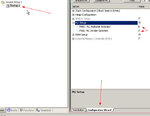kodi.sudar
Member level 5
Hi alex
nice work . I need to control the servo motor with the help of lpc2138 and i am trying to use pwm and i found your application it helps me a lot but the thing is the pwm generated fails to drive the servo. can you help me to assign the values for PWMMR0,PWMMR1,PWMMR2 registers, i am using pwm 2
Thanks
nice work . I need to control the servo motor with the help of lpc2138 and i am trying to use pwm and i found your application it helps me a lot but the thing is the pwm generated fails to drive the servo. can you help me to assign the values for PWMMR0,PWMMR1,PWMMR2 registers, i am using pwm 2
Thanks
